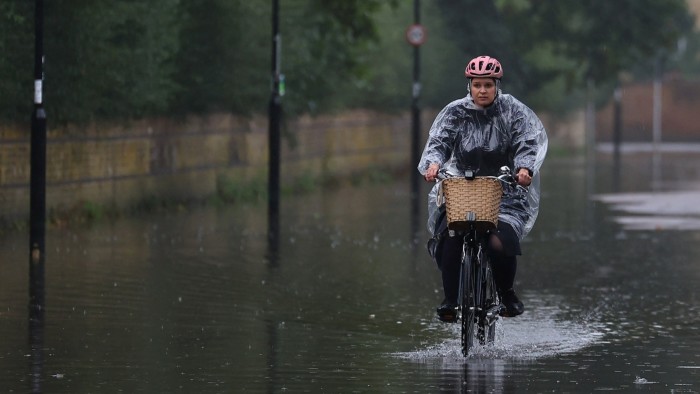Stay informed with free updates
Simply sign up to the Climate change myFT Digest — delivered directly to your inbox.
The UK government’s preparations for the flooding and higher temperatures triggered by climate change are “inadequate” and in some cases have got worse, its official adviser has warned.
“Progress is either too slow, has stalled, or is heading in the wrong direction,” the Climate Change Committee (CCC) said on Wednesday in a report responding to the threat climate change poses to the UK’s food systems, infrastructure, health, homes and economy.
Warmer, wetter winters have combined with rising sea levels and drier, hotter summers to raise the risk of both flooding and droughts in the UK, creating a need for much clearer goals on improving the country’s climate resilience, it said.
The committee’s first report on adaptation under chief executive Emma Pinchbeck, a former UK energy lobbyist, scrutinised delivery of an adaptation plan published by the previous government in 2023.
The Labour government has not significantly shifted the dial on already poor adaptation planning, the CCC’s report said, despite its manifesto commitment to “improve resilience and preparation across central government, local authorities, local communities and emergency services”.
Cross-bencher Baroness Brown, chair of the CCC’s adaptation committee, said the UK should prepare for a disaster similar to the floods that hit Valencia, Spain, last year, when a year’s worth of rain fell in just three hours and 20 minutes, killing more than 200 people. “We need government to recognise this is the disaster that could be happening tomorrow.”
More than 6.3mn properties, half of the UK’s top quality agricultural land and over a third of railways and roads are already at risk of flooding, the report said.
The government should set long-term targets to cut flooding risk in the UK, and ask the National Energy System Operator to consider how flooding and heat and water scarcity could affect the UK’s power and grid operations, it said.
The upcoming government spending review should ringfence adaptation spending, Brown added. “The government is under a lot of pressure to make cuts, but this isn’t the one to cut.”
The report also highlighted the threats posed by extreme heat to the UK’s public health and critical infrastructure, as it can cause rail lines to buckle and power lines to sag. It highlighted research suggesting there could be 10,000 heat related deaths a year by the middle of the century, and a 7 per cent hit to GDP.
No single area of adaptation spanning the economy, health, built environment, infrastructure and land management was good enough, the report said. Water supply management has worsened since the CCC’s previous progress report in 2023, with a slow rate of leakage reduction, as had elements of marine habitat monitoring. Some policies on flood resilience had worsened.
Friederike Otto, senior lecturer in climate science at Imperial College London, said the government was doing an “OK job” on cutting CO₂ emissions. “However, they simply can’t afford to maintain the status quo on adaptation, which is leaving the UK dangerously exposed.”
A spokesperson for the Department for Environment, Food and Rural Affairs said it was investing “a record £2.65bn to repair and build flood defences, protecting tens of thousands of homes and businesses and helping local communities become more resilient to the effects of climate change”.
“We will now carefully consider the findings of the Climate Change Committee’s report, and we will respond in due course.”
